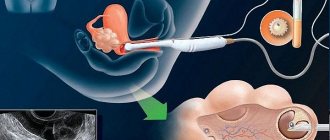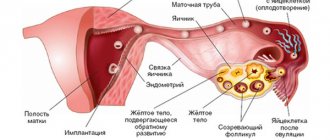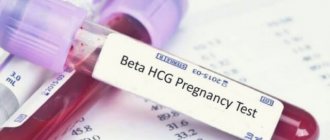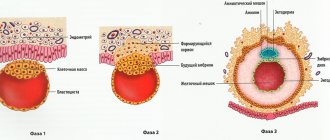IVF or in vitro fertilization, unfortunately, does not provide a 100% guarantee of a successful pregnancy. According to statistics, only every third woman who has gone through all stages of IVF has a chance to become a mother of a baby on the first try. Each organism is individual: some women are at risk of miscarriage throughout their entire pregnancy and are kept in confinement; for some, conception proceeds without problems, while for others, the body rejects the blastocyst. The most important thing for a woman after embryo transfer is not to be nervous and to fully comply with all the doctor’s instructions. After the embryo is implanted into the patient, she carefully listens to herself and her feelings, reacting sharply to any of her conditions. This leads to additional worries and nerves. Particularly stressful are situations when menstruation begins after IVF, and the woman does not know whether pregnancy can occur in this case.
Determining the nature of bleeding
First, you need to be absolutely sure that it was definitely your period after the replantation, and that implantation did not occur. Implantation (introduction of a fertilized egg into the mucous membrane of the uterine wall) occurs within three days and may be accompanied by:
- not abundant brownish discharge;
- a few drops of bright blood;
- nagging, mild pain in the lower abdomen;
- nausea;
- increased temperature;
- irritability.
As statistics show, during ecoconception, all the body’s strength is practically exhausted by numerous hormonal injections, so patients are often diagnosed with minor bleeding. Most likely, the female body reacts to the IVF procedure in this way, because it is extremely stressful for it due to numerous hormonal “shocks” and surgical interventions.
There may be some discharge after IVF, and this is considered normal. The only thing you need to pay attention to is their character: color, abundance, structure and intensity.
There should not be a full menstruation during any pregnancy, but light bleeding, alas, does occur.
If, after IVF transfer, severe bleeding occurs, with blood clots and even pieces, and you yourself understand that this is definitely not your period, then you should definitely contact a specialist. As a rule, the patient’s support is adjusted and may even be sent to the hospital for storage.
Feeling after replanting
Artificial insemination is always accompanied by the use of hormonal drugs. It is this factor that can change the well-being of expectant mothers. Some may constantly feel sleepy, while others, on the contrary, may suffer from insomnia. Women may also experience other side effects of hormonal treatment, but this does not in any way indicate pregnancy. After embryo transfer and on day 12, there may be no sensations. This is absolutely normal, and you shouldn’t think that something went wrong.
Causes of bleeding
There can be many reasons for bleeding: violation of doctor’s instructions, physical activity, stress, insufficient hormonal support, impaired absorption of progesterone suppositories, etc. During IVF pregnancy, the risk of miscarriage is much higher than during natural pregnancy, therefore, if the slightest bleeding appears, emergency measures must be taken immediately.
USEFUL INFORMATION: After embryo transfer, the stomach feels as if it were before menstruation
But if you simply have a condition after the transplant, as if your period is about to begin (stomach pulls), but there is no discharge, then this is not a reason to panic, because your ovaries were injured, so pain is considered normal. Some women experience tightness in the lower abdomen even before the 12th week.
In order to be sure whether the pregnancy has continued or the appearance of menstruation is one hundred percent clear, it is necessary to take a fasting blood test for hCG. You shouldn’t trust conventional pregnancy tests, because sometimes they can be wrong, and you don’t need extra stress.
Menstruation during IVF pregnancy for the first time may continue for months, but there should be no pain in the lower abdomen, and the discharge should be scanty, without clots.
Secretion on the first day after the IVF procedure
It is necessary to immediately note that the day after the procedure plays an important role, because some vaginal secretion is considered normal for one period of time, and after that requires an immediate visit to the hospital.
According to experts, discharge after insemination or embryo transfer (two-day, three-day, five-day) should not differ sharply from normal secretion.
It is generally accepted that discharge after embryo transfer should have the following characteristics:
- complete transparency;
- homogeneous consistency without clots and lumps;
- complete absence of odor;
- a small amount (up to 1 teaspoon per day);
- without such unpleasant sensations as itching and burning.
It turns out that the discharge after embryo transfer is characterized by the consistency of mucus, which maintains the normal balance and acid level of the vaginal microflora, and also blocks dryness of the genital tract. It is this secretion that is considered absolutely safe and should not cause concern in women.
In some situations, there is bleeding after embryo transfer. Most often they smear, leaving scanty red marks on the panty liner. If a woman notices such deviations for a day or more, she needs to go to the hospital. Situations are especially dangerous when bloody secretion is accompanied by nagging pain in the lower abdomen.
But even in such situations, doctors recommend that patients remain calm and not “invent” unnecessary problems, because such an attitude can only aggravate the situation.
Periods after IVF
If, after the transplantation, a woman experiences abundant bright red discharge with small clots (menstruation) and an hCG test shows no pregnancy, then, unfortunately, the attempt was unsuccessful. The day when your period begins after an infusion is the most terrible day in the life of an eco-woman, because in vitro fertilization does not provide a 100% guarantee of pregnancy. There are enough reasons for failure:
- blastocyst of low quality or with genetic defects;
- endometrium (uterine mucosa) more than 13 mm;
- inflammatory process;
- age (reduced quality of eggs or sperm);
- bad habits (smoking, drugs, alcohol) or a sedentary lifestyle after replanting;
- medical error;
- incompatibility at the genetic level of the material of partners.
IVF results: what affects?
The likelihood of pregnancy after IVF is influenced by many factors. For example:
- Age of future parents. Everyone knows that the most favorable reproductive age for a woman is from 20 to 30 years. After 35 years, the likelihood of getting pregnant, successfully carrying a pregnancy and giving birth to a healthy child becomes lower. By this age, the number of eggs in a woman’s body decreases, and their quality deteriorates.
- Duration and cause of infertility. How much time a couple has spent dealing with infertility also plays an important role. The longer a woman cannot get pregnant, the more the chances of a successful IVF outcome decrease. However, it should be remembered that the causes of infertility are different for each couple, and accordingly, the fight against them will be individual.
- Anti-Mullerian hormone indicator. This hormone is produced in the ovaries, if its level is less than 0.8, then there is a risk of a negative outcome of artificial insemination. However, AMH levels can be changed with the help of properly selected drug treatment.
- Quality of biological material. The positive outcome of the IVF procedure depends on whose material was used during fertilization. Statistics show that couples who used donor eggs and sperm are more likely to conceive and give birth to a healthy child than couples who used their own biological material. This is explained by the fact that donor material is carefully selected and examined to exclude the birth of children with pathologies.
- Women who have given birth. Those women who have already become mothers, regardless of the method (natural pregnancy or artificial insemination), are more likely to achieve the desired outcome. These women often leave good reviews on day 12 after embryo transfer, and a positive test is proof of this.
- BMI. Some experts believe that the fertilization process is also affected by a woman’s weight. A body mass index of 19 to 30 is considered optimal. In this case, the chances of getting pregnant and giving birth are much higher.
- Bad habits. Alcohol affects the effectiveness of medications taken, and tobacco interferes with successful embryo implantation. It is also better to give up coffee.
- Positive attitude. Despite the fact that the emotional state does not have a direct impact on the outcome of the procedure, an optimistic attitude is always necessary.
Complications after IVF
No matter how each family prepares itself before the protocol, the statistics are inexorable: only about 40% of IVF attempts result in childbirth. In some cases, even if conception has occurred, complications may occur during the process that will prevent the pregnancy from ending successfully.
Main complications:
- Frozen pregnancy is the development of an embryo until a certain period, after which it stops developing. This happens, of course, during natural pregnancy, but, unfortunately, during the IVF procedure this can happen repeatedly.
- Ectopic pregnancy naturally occurs only if a woman has fallopian tubes in 2-3% of cases. This situation requires surgical medical intervention, which ends with removal of the fallopian tube.
- OHSS – pregnancy hyperstimulation syndrome. As a rule, after menstruation has passed after the replantation, a woman’s cycle becomes very disrupted. Many people are used to having their period start on a certain day, but after a negative IVF result, the cycle can be seriously disrupted. As a rule, even several months after an unsuccessful attempt, there may be delays or the arrival of menstruation at different times, and their nature also changes: duration, abundance, etc. This is considered normal after artificial insemination. But if the next menstruation does not occur for a long time after unsuccessful IVF, then the doctor prescribes treatment in order to “cause” them.
USEFUL INFORMATION: Negative pregnancy test after IVF procedure
Failed IVF and menstruation
According to numerous reviews from patients who have undergone the procedure, after IVF, menstruation most often occurs 3-12 days after embryo transfer. Initially, menstruation after IVF has the character of bloody spotting, but then full-fledged discharge appears. Although special care should be taken during this period, sometimes bleeding is not a sign of the appearance of menstruation after IVF, it is uterine bleeding, stopping the development of which can preserve the pregnancy.
If a woman is not sure about the results of the procedure, but her period does not occur after IVF, then she must wait a few days after discontinuing supporting hormonal medications (3-5 days). If your period does not come after IVF, and a negative result was obtained when testing for hCG, you should not think that the data is erroneous; the reason for the absence of periods after IVF should be looked for elsewhere.
As a rule, a delay in the menstrual cycle after IVF does not alarm doctors, because such a phenomenon occurs very often. After all, after the procedure, time is needed to restore natural processes. But if after IVF menstruation does not occur for a long time, then you should contact your doctor to perform diagnostic measures and identify the cause of the pathological condition.
A common reason for the absence of menstruation after IVF is the patient’s nervous overstrain and stress due to a negative result. Nervous disorders in a normal situation can cause long-term irregularities in the menstrual cycle, and after IVF the situation worsens significantly.
Very often, after IVF, menstruation in the first cycle comes exactly on time, and their character does not change, but the 2nd and subsequent cycles after IVF occur with certain changes. Complete normalization of menstruation after IVF occurs within 3-6 months, but in some cases the process can take approximately 1 year. In rare situations, doctors prescribe special drugs to stimulate the menstrual cycle after IVF.
What do doctors advise?
To see a positive test on the 12th day after embryo transfer, immediately after the procedure you must adhere to certain rules:
- you need to rest for several hours after replanting;
- excessive loads are contraindicated;
- baths and cold showers will have to be put off for now;
- protect yourself from carriers of infections, viruses and fungi;
- make your diet more correct, but not dramatically (for starters, just reduce your consumption of junk food);
- self-medication is unacceptable, eliminate all unnecessary medications and supplements, as well as alcohol and cigarettes;
- Be sure to walk in the fresh air every day;
- night sleep for at least 8-10 hours, daytime rest for at least 1 hour;
- control your intestines (to avoid constipation and diarrhea);
- Stress, conflicts, nervous breakdowns and disorders are contraindicated for you now.
What should you pay attention to after replanting?
- Temperature. An increase in body temperature to 37-37.3 degrees is acceptable. This is due to hormonal changes in the body.
- Painful sensations. These sensations on the 12th day after embryo transfer are normal. You may be additionally prescribed antispasmodics.
- Gastrointestinal disorders and frequent urination. It is explained by the close proximity of these organs to the uterus and ovaries in the pelvis, which produce pressure on them. Progesterone can also influence this feeling.
- "Wiggles" in the lower abdomen. This is actually a pulsation of the abdominal aorta. The woman will hear real movements much later.










